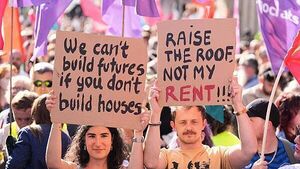High rents and cost of living: Can a young person afford to live in Dublin?

Eva Osborne
Recent figures from Daft.ie show the average open-market rent nationwide between April and June was €2,055 per month.
This is significantly higher than the low of just €765 in 2011 and 51 per cent higher than before the outbreak of Covid-19.
Young people and college students in particular are struggling to live sustainably in the country's capital, as inflation in Dublin – at 6.5 per cent – is now close to the average seen in the rest of the country (7.3 per cent).
Rents in Dublin had previously been rising at a slower pace than elsewhere, but the capital is now catching up to the rest of the country.
In the latest weekly earnings analysis from the Central Statistics Office (CSO), the average weekly earnings for the 15-24 years age group were revealed to be €353.44 in 2023.
Accounting for both inflation and wage growth trends, we arrive at a figure of approximately €385 today.
In the same analysis from the CSO in 2023, the average weekly earnings for the 25-29 age group were shown €663.13.
Accounting for both inflation and wage growth trends for this figure, we end up with around €715.
So, how comfortably can a young person live in Dublin today? Is it sustainable?
15-24 year olds
As the recent figures from Daft.ie show, the average open-market rent nationwide between April and June was €2,055 per month.
However, most 15-24 year olds would be seeking a room in a house, rather than a flat to themselves, for monetary reasons.
If we assume the average 20-year-old is spending around €1,000 per month on rent excluding bills (which is optimistic), then that means around two-thirds of their monthly earnings are spent on rent.

If they have no financial help from family or, if they are studying, from SUSI or other financial supports, it leaves them fairly tight for money for the rest of the month.
They would be left with around €540 after paying rent, leaving them with €135 per week for food, bills, social events, and other expenses.
This would obviously make it quite tough to save any money at all, and also doesn't take into account college fees for those who are studying.
Food price inflation in Ireland rose to a 20-month high of 5 per cent in August, according to the latest flash estimate for the harmonised index of consumer prices (HICP), The Irish Times reported.
This makes it even more difficult for those in the 15- to 24-year-old age bracket. If our 20-year-old spends €40 per week on food, they're left with €95 per week, or €380 for the month.
With bills, social events, and other expenses still needing to be accounted for, our 20-year-old definitely would not want to be finding holes in their socks or cracking their phone screen.
25-29 year olds
Those in the 25-29 age group would rather not be living in a house share and would prefer a place of their own.
For many, this is the goal while they live at home and save money, or renew their lease in a single room in a house full of other working professionals.
If we look at the average rent for a small studio apartment or one-bedroom apartment in Dublin on Daft.ie, we see figures coming in at around the €1,400 mark.
Many go over this, of course, but we're hoping our 27-year-old is lucky and finds a good one on the lower end of the scale.

So, with weekly earnings of around €715, our 27-year-old makes €2,860 per month.
This means half is gone on rent, leaving them with €1,460 for the month.
Those in the 25-29 age group would be much more inclined to want to save their money and, unlike our hypothetical 20-year-old, are in a much better position to do so.
If they strive to save €300 per month, they are left with €1,160. Between bills, flat maintenance, socialising, and other expenses, the rest of the 27-year-old's wages won't be long leaving their pocket.
They are in a much more comfortable position than our 20-year-old, though, who would find it hard to live comfortably in the city centre without any financial support from their family, especially if they are studying.
Do you think it is harder for a young person to live in Dublin now compared to 20 years ago? And what do you think is the main challenge? Let us know by answering our poll.




